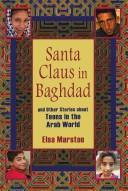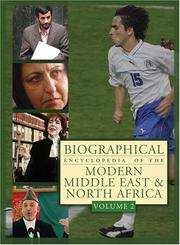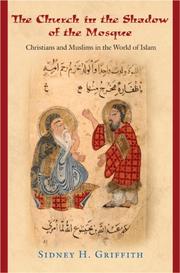| Listing 1 - 7 of 7 |
Sort by
|
Book
ISBN: 9788863720549 Year: 2008 Publisher: Roma Ed. di storia e letteratura
Abstract | Keywords | Export | Availability | Bookmark
 Loading...
Loading...Choose an application
- Reference Manager
- EndNote
- RefWorks (Direct export to RefWorks)
Historiography --- Historiographie --- History --- Histoire --- Arab countries --- Etats arabes --- Historiography. --- Historical criticism --- Authorship --- Criticism --- Arab world --- Arabic countries --- Arabic-speaking states --- Islamic countries --- Middle East
Periodical
ISSN: 17550912 17550920 Year: 2008 Publisher: London
Abstract | Keywords | Export | Availability | Bookmark
 Loading...
Loading...Choose an application
- Reference Manager
- EndNote
- RefWorks (Direct export to RefWorks)
Sociology of culture --- Internal politics --- International relations. Foreign policy --- Arab states --- Arab countries periodicals. --- Periodicals --- Arab countries --- Arab countries. --- Arab world --- Arabic countries --- Arabic-speaking states --- Islamic countries --- Middle East --- Arts and Humanities --- History
Periodical
ISSN: 21026416 1969248X Year: 2008 Publisher: Tours Equipe Monde arabe Méditerranée
Abstract | Keywords | Export | Availability | Bookmark
 Loading...
Loading...Choose an application
- Reference Manager
- EndNote
- RefWorks (Direct export to RefWorks)
Les Cahiers d'EMAM sont une revue interdisciplinaire qui se propose de contribuer à la restitution des savoirs sur le Monde arabe et la Méditerranée, dans leurs interférences avec le reste du monde, autour des questions urbaines et des processus de constructions / reconfigurations territoriales dans leurs dimensions sociales, économiques et politiques en encourageant les idées nouvelles et les démarches comparatives.
urban studies --- urban sociology --- geography --- arab and mediterranean world --- Arab countries --- Mediterranean Region --- Circum-Mediterranean countries --- Mediterranean Area --- Mediterranean countries --- Mediterranean Sea Region --- Arab world --- Arabic countries --- Arabic-speaking states --- Islamic countries --- Middle East --- Mediterranean Region. --- Arab countries. --- Sociology of environment --- Ethnology. Cultural anthropology --- Social geography
Book
ISBN: 9780231141949 0231141947 9780231512084 0231512082 9786613628121 1280598298 Year: 2008 Publisher: New York, NY
Abstract | Keywords | Export | Availability | Bookmark
 Loading...
Loading...Choose an application
- Reference Manager
- EndNote
- RefWorks (Direct export to RefWorks)
Traveling to archives in Tunisia, Morocco, France, and England, with visits to Egypt, Jordan, Lebanon, and Spain, Nabil Matar assembles a rare history of Europe's rise to power as seen through the eyes of those who were later subjugated by it. Many historians of the Middle East believe Arabs and Muslims had no interest in Europe during this period of Western discovery and empire, but in fact these groups were very much engaged with the naval and industrial development, politics, and trade of European Christendom. Beginning in 1578 with a major Moroccan victory over a Portuguese invading army, Matar surveys this early modern period, in which Europeans and Arabs often shared common political, commercial, and military goals. Matar concentrates on how Muslim captives, ransomers, traders, envoys, travelers, and rulers pursued those goals while transmitting to the nonprint cultures of North Africa their knowledge of the peoples and societies of Spain, France, Britain, Holland, Italy, and Malta. From the first non-European description of Queen Elizabeth I to early accounts of Florence and Pisa in Arabic, from Tunisian descriptions of the Morisco expulsion in 1609 to the letters of a Moroccan Armenian ambassador in London, the translations of the book's second half draw on the popular and elite sources that were available to Arabs in the early modern period. Letters from male and female captives in Europe, chronicles of European naval attacks and the taqayid (newspaper) reports on Muslim resistance, and descriptions of opera and quinine appear here in English for the first time. Matar notes that the Arabs of the Maghrib and the Mashriq were eager to engage Christendom, despite wars and rivalries, and hoped to establish routes of trade and alliances through treaties and royal marriages. However, the rise of an intolerant and exclusionary Christianity and the explosion of European military technology brought these advances to an end. In conclusion, Matar details the decline of Arab-Islamic power and the rise of Britain and France.
Arabs --- Attitudes --- Arab countries --- Europe --- Relations --- Foreign public opinion, Arab --- History --- Attitudes. --- Foreign public opinion, Arab. --- Ethnology --- Semites --- North Africans --- Council of Europe countries --- Eastern Hemisphere --- Eurasia --- Arab world --- Arabic countries --- Arabic-speaking states --- Islamic countries --- Middle East --- Etats arabes --- Foreign relations --- Relations extérieures --- Arabs - Attitudes --- Arab countries - Relations - Europe --- Europe - Relations - Arab countries --- Europe - Foreign public opinion, Arab --- Europe - History - 17th century - Sources --- Arab countries - History - 1517-1918 - Sources

ISBN: 1281810843 9786611810849 0253000327 9780253000323 0253220041 9780253220042 9781281810847 Year: 2008 Publisher: Bloomington IN : Indiana University Press,
Abstract | Keywords | Export | Availability | Bookmark
 Loading...
Loading...Choose an application
- Reference Manager
- EndNote
- RefWorks (Direct export to RefWorks)
What is it like to be a young person in the Arab world today? This lively collection of eight short stories about Arab teenagers living in Iraq, Tunisia, Egypt, the West Bank, Lebanon, Syria, Jordan, and a Palestinian refugee camp engagingly depicts young people's experiences growing up in the Middle East. The characters, drawn from urban and rural settings and from different classes as well as a mix of countries, confront situations involving friends, family, teachers, and society at large. Along with some specifically Middle Eastern issues, such as strife in Iraq, the hardships of life in
Short stories. --- Coming of age --- Conduct of life --- Arab countries --- Middle East --- Arab world --- Arabic countries --- Arabic-speaking states --- Islamic countries --- Asia, South West --- Asia, Southwest --- Asia, West --- Asia, Western --- East (Middle East) --- Eastern Mediterranean --- Fertile Crescent --- Levant --- Mediterranean Region, Eastern --- Mideast --- Near East --- Northern Tier (Middle East) --- South West Asia --- Southwest Asia --- West Asia --- Western Asia --- Orient --- Social life and customs --- Behavior --- Bildungsroman --- Coming-of-age stories

ISBN: 9781414418896 9781414418902 9781414418919 Year: 2008
Abstract | Keywords | Export | Availability | Bookmark
 Loading...
Loading...Choose an application
- Reference Manager
- EndNote
- RefWorks (Direct export to RefWorks)
Arab countries --- Middle East --- Africa, North --- Etats arabes --- Moyen-Orient --- Afrique du Nord --- Biography --- Encyclopedias. --- Encyclopedias --- Biographies --- Encyclopédies --- 929 <6> --- Biografie. Genealogie. Heraldiek--Afrika --- 929 <6> Biografie. Genealogie. Heraldiek--Afrika --- Encyclopédies --- Asia, South West --- Asia, Southwest --- Asia, Western --- East (Middle East) --- Eastern Mediterranean --- Fertile Crescent --- Levant --- Mediterranean Region, Eastern --- Mideast --- Near East --- Northern Tier (Middle East) --- South West Asia --- Southwest Asia --- Orient --- Arab world --- Arabic countries --- Arabic-speaking states --- Islamic countries --- Barbary States --- Maghreb --- Maghrib --- North Africa --- Asia, West --- West Asia --- Western Asia

ISBN: 9780691146287 9780691130156 0691130159 Year: 2008 Publisher: Princeton, N.J. Princeton University Press
Abstract | Keywords | Export | Availability | Bookmark
 Loading...
Loading...Choose an application
- Reference Manager
- EndNote
- RefWorks (Direct export to RefWorks)
Christianity and culture --- Christianity and other religions --- Islam --- History. --- Relations --- Christianity --- Arab countries --- Church history. --- Christianisme et civilisation --- -Christianity and other religions --- -Islam --- -297.116*1 --- Contextualization (Christian theology) --- Culture and Christianity --- Inculturation (Christian theology) --- Indigenization (Christian theology) --- Relatie Islam tot Christendom --- -Church history. --- 297.116*1 Relatie Islam tot Christendom --- 297.116*1 --- Mohammedanism --- Muhammadanism --- Muslimism --- Mussulmanism --- Religions --- Muslims --- Syncretism (Christianity) --- Culture --- History --- Islam&delete& --- Relations&delete& --- Christianity&delete& --- Arab world --- Arabic countries --- Arabic-speaking states --- Islamic countries --- Middle East --- Christian church history --- Church history --- Christianisme --- Histoire --- Etats arabes --- Histoire religieuse --- Christianity and culture - Arab countries - History --- Christianity and other religions - Islam - History --- Islam - Relations - Christianity - History --- Arab countries - Church history
| Listing 1 - 7 of 7 |
Sort by
|

 Search
Search Feedback
Feedback About UniCat
About UniCat  Help
Help News
News